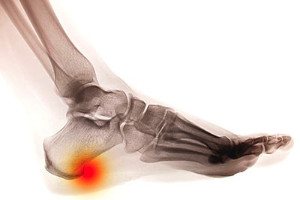 A heel spur is defined as a bony protrusion that develops on the heel of the foot, and it may cause severe discomfort. Research has shown that calcium deposits may gradually form under the heels, resulting in the development of heel spurs. Other symptoms of this ailment may include an achiness that is felt in the heel for the majority of the day, sharp heel pain while standing especially in the morning, and the affected area appearing swollen and tender. There are several causes for heel spurs to develop, including an injury that may tear the membrane covering the heel, and strain to the ligaments that may weaken the soft tissue. Relief may be found by resting and elevating the foot which may reduce swelling, in addition to wearing cushioned shoes. A consultation with a podiatrist will aid further increasing your knowledge about heel spurs.
A heel spur is defined as a bony protrusion that develops on the heel of the foot, and it may cause severe discomfort. Research has shown that calcium deposits may gradually form under the heels, resulting in the development of heel spurs. Other symptoms of this ailment may include an achiness that is felt in the heel for the majority of the day, sharp heel pain while standing especially in the morning, and the affected area appearing swollen and tender. There are several causes for heel spurs to develop, including an injury that may tear the membrane covering the heel, and strain to the ligaments that may weaken the soft tissue. Relief may be found by resting and elevating the foot which may reduce swelling, in addition to wearing cushioned shoes. A consultation with a podiatrist will aid further increasing your knowledge about heel spurs.
Heel spurs can be incredibly painful and sometimes may make you unable to participate in physical activities. To get medical care for your heel spurs, contact one of our podiatrists from Princeton Foot & Ankle Associates. Our doctors will do everything possible to treat your condition.
Heels Spurs
Heel spurs are formed by calcium deposits on the back of the foot where the heel is. This can also be caused by small fragments of bone breaking off one section of the foot, attaching onto the back of the foot. Heel spurs can also be bone growth on the back of the foot and may grow in the direction of the arch of the foot.
Older individuals usually suffer from heel spurs and pain sometimes intensifies with age. One of the main condition's spurs are related to is plantar fasciitis.
Pain
The pain associated with spurs is often because of weight placed on the feet. When someone is walking, their entire weight is concentrated on the feet. Bone spurs then have the tendency to affect other bones and tissues around the foot. As the pain continues, the feet will become tender and sensitive over time.
Treatments
There are many ways to treat heel spurs. If one is suffering from heel spurs in conjunction with pain, there are several methods for healing. Medication, surgery, and herbal care are some options.
If you have any questions feel free to contact our offices located in Princeton, and West Windsor, NJ . We offer the latest in diagnostic and treatment technology to meet your needs.
